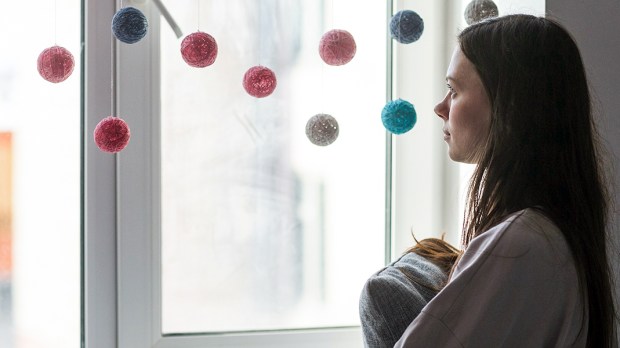As Catholics, we often hear about the importance of being open to life and the great value of parenthood, through which we share in God’s love and power as Creator and build a family, the “domestic Church.” We celebrate the births of children into our communities, and when we see dapper grooms and blushing brides, the first question that may come to mind might be, “When will we be celebrating the baptism of their first baby?”
But what if, in spite of your desire to start a family, nothing happens? Months turn into years, and finally you receive the diagnosis: you’re infertile.

Read more:
The pain of infertility and the indignity of IVF
This news can be very difficult to hear and accept, especially as others around you welcome the gift of new life into their families. Many Catholic women receive constant signals from their environment that, if they don’t have a child, they must be selfish, or too focused on their career, or maybe they just haven’t tried or prayed hard enough.
Although stereotypes have changed, you may end up believing that you must become a mother, or else you will be unhappy for the rest of your life. This is not necessarily true, but if you believe it and obsess over it, it can become a self-fulfilling prophecy. The first step to overcoming this negativity is realizing that it’s normal to feel disappointed, depressed, and isolated—but there’s also a way out.

Read more:
Adopting Macyn: How infertility led one couple down an unlikely path to joy
Infertility causes high psychological stress
Psychological studies show that infertile women experience depression with the same intensity as those who are terminally ill.
Having children is a normal and expected event that is often a key part of a person’s identity and social environment; not being able to conceive and bear children means you will miss out on all the related experiences and rites of passage involved with this. If you are never be a mother, you won’t be a grandmother, either. You won’t get to experience your child’s first tooth, first step, or first smile. You will never prepare for your children’s First Communion, nor be present for their weddings.
The resulting sensation of loss and helplessness can be traumatic. We can be tempted to pity ourselves, to complain, and to view ourselves as victims. We can become overly protective of ourselves, and look for our identity in our sense of victimhood. If we can’t have motherhood, permanent martyrdom might become the unconscious substitute.

Read more:
A Hidden Grief: Offering Support Through Miscarriage and Infertility
“Why did it happen to me?” we ask ourselves. A more realistic question is, “Why shouldn’t it?” Everyone’s life has its measure of suffering. The pain of infertility is isolating, but fertile women don’t have it easy either; their children sometimes fall gravely ill or die, or they themselves may suddenly become terminally ill while their children are still young. Motherhood is not just fulfillment and happiness; it can involve many forms of suffering that only a mother can experience.
Infertility is a challenge, just like the birth of a child
It takes some humility for an infertile woman to accept her situation and recognize it before herself and others: she will never be a biological mother. It’s a situation that is beyond her control, and the sooner she accepts it, the better. God has allowed it, within His loving plan. Yes, one path is closed, but others are open, and we can see them when we stop beating despairingly on the locked gate. When we stop feeling sorry for ourselves and take the initiative in our life again, it will be easier. Acceptance gives us strength and helps us continue our lives with greater generosity, seeing our infertility not as the end of the road, but as a tremendous opportunity.
Start by taking care of yourself
Before taking care of others, we must take care of ourselves. We must face our own difficult feelings, and learn to manage them in a healthy way.
If a couple is infertile, a husband and wife can share their pain. it’s important to constantly rebuild the sense of closeness between you and strengthen your bond. Allow this difficulty to bring you together, instead of dividing you.

Read more:
The Deep Pain of Infertility: A Man’s Perspective
It’s often a good idea to seek professional help to deal with the grief involved. Therapy, especially regarding your relationship with your own body, can help. It’s easy to reject something that you feel has failed you, and start to suffer from psychosomatic ailments, neglect yourself, and either gain weight or starve yourself. It’s important to embrace yourself and your body.
It’s good to learn relaxation exercises, breathing exercises, and techniques that help you deal with difficult emotions. Workshops and seminars to improve your skills and quality of life can also help. We need to enjoy what we have, instead of tormenting ourselves with that which has been denied us—but sometimes that requires work. We have to want it.
You have access to psychological and spiritual reserves of strength you never knew you had, if you use the right means. What initially feels like a dead end can be the means God uses to help us discover our vocation to exercise our “spiritual motherhood” as a gift that blesses the lives of others.

Read more:
10 Things Other than IVF that Could Help a Couple Suffering with Infertility
Spiritual motherhood as a valuable expression of maternity
In the apostolic exhortation Familiaris consortio on the family in the modern world, John Paul II pointed out that biological motherhood isn’t the only way to be a mother; “even when procreation is not possible, conjugal life does not, for this reason, lose its value. Physical sterility, in fact, can be for spouses an occasion for other important services, such as adoption, various forms of educational work, and assistance to other families and to poor or handicapped children.”
Childlessness does not have to define us; we are much more than our infertility. We may pass through a difficult time when we are diagnosed, but we can come out of that dark tunnel stronger, more open to the future and other possibilities. We shouldn’t focus on our limitations; rather, we should focus on all the good qualities and talents that make us who we are: a gift from God to ourselves and to others.
This article was originally published in the Polish edition of Aleteia, and has been translated and/or adapted here for English-speaking readers.

